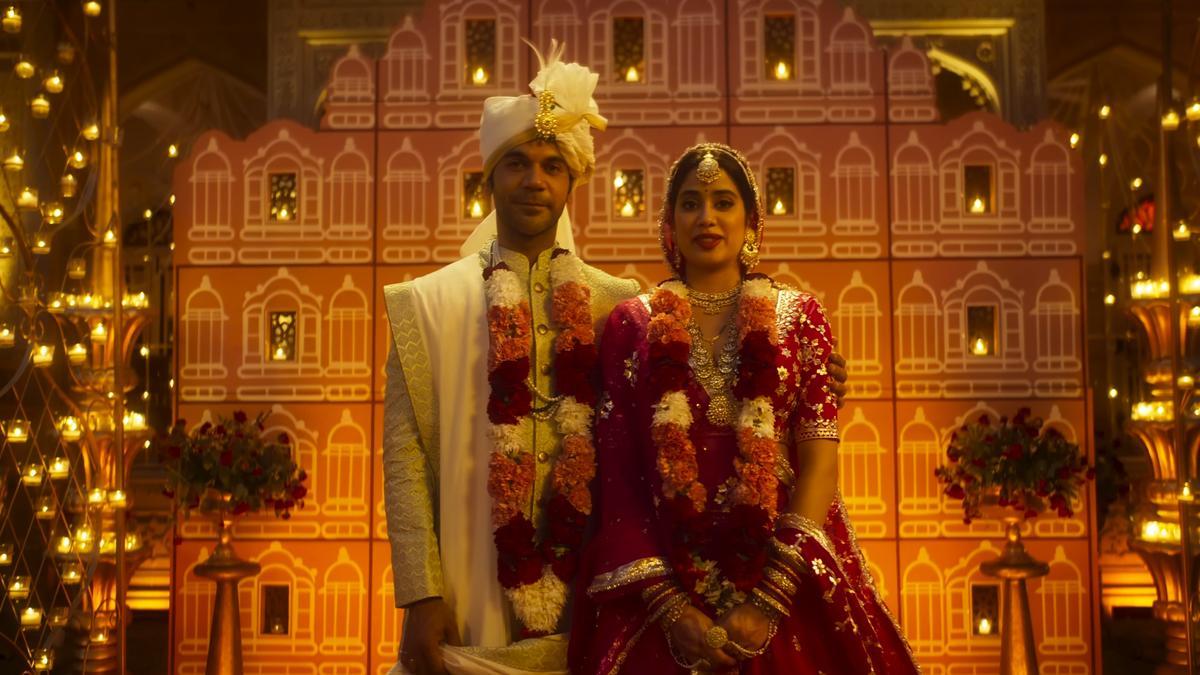
These are strange times, cinematically speaking, for fans of Rajkummar Rao and cricket. In his last release, the biographical drama Srikanth, the actor played a visually-impaired man who gives up his cricketing prospects to pursue higher studies abroad. “Education is more important to me, not cricket,” he explained. As though to make amends, Rao returns, three weeks later, in *Mr. and Mrs. Mahi*, where he embodies a cricket-crazed monomaniac named Mahendra. “For me, cricket is life; life is cricket,” he asserts. Even though cricket sails him by, Mahendra clings to the sport with unrelenting zeal.
Sharan Sharma’s film opens in Jaipur in 2017, introducing us to Mahendra slogging in local club tournaments, jockeying for a spot on the state team. His father, played by an irate albeit highly perceptive Kumud Mishra, owns a sports shop and has given Mahendra an ultimatum: succeed in his dream of representing India or join the family business. Mahendra comes close, employing sly maneuvers and overzealous tactics on the pitch, but ultimately misses his chance by a hair’s breadth. This failure grounds him for good, leading to his marriage with the sweet and trusting Mahima, played by Janhvi Kapoor. Mahima, a doctor, falls for Mahendra’s innate ‘honesty,’ making her the second Janhvi Kapoor character in a row to marry injudiciously after *Bawaal* (2023).
Sharma directs the opening half-hour of *Mr. and Mrs. Mahi* with an unvarnished sweetness. Rao and Kapoor commit to the comedic elements of a newly married couple trying to find common ground. They discover that, in addition to sharing the nickname ‘Mahi,’ they both love cricket. This shared passion drives them to attend games wearing matching No.7 jerseys in homage to former Indian skipper MS Dhoni, whose philosophy, ‘process is more important than result,’ apparently inspired this film. The song ‘Agar Ho Tum’ is a touching anthem in this stage of the movie, capturing a rare moment of contentment in Mahendra’s otherwise unfulfilled life.
However, this light-hearted ambiance dissipates as the film adopts a much darker and dramatic turn. Mahendra discovers that his wife had cricketing talents that she abandoned due to her father’s pressure to pursue medicine. Obsessed with realizing his own unfulfilled dreams through her, he manipulates her into rekindling her cricketing aspirations under the guise of following her heart. Mahendra’s hope is to frame her success as his own, pushing her to try out for the state women’s team. Although he effectively coaches her onto the team in record time, Mahendra grows resentful and irritable when Mahima does not credit him on TV.
This part of the film paints Mahendra as a quintessentially sour, sulky, and petulant Indian male.
. His thirst for fame and recognition ties him back to Ajay Dixit, portrayed by Varun Dhawan in *Bawaal*—both characters driven by image obsession. Mahendra’s cruelty towards Mahima stems from his own feelings of inadequacy and failure. With his dream unfulfilled, he imposes it on his wife. “Was I just a seedhi (ladder) to you?” Mahima demands in one of the film’s several blunt metaphors.
Sharma and co-writer Nikhil Mehrotra delve into the complexity of Mahendra’s character—a jealous has-been who struggles with his roles as both coach and husband. Despite having revealed Mahendra’s pettiness and self-absorption, the film sets him on a simplistic learning curve. His self-reflection unfolds over a single somber song and a motivational speech from his mother. The narrative potential of Mahima’s individual growth is sidelined, reducing the film’s focus instead to a sentimentally charged, repentant Mahendra.
Reminders of other films pervade *Mr. and Mrs. Mahi*. Hardly any idea, visual element, or soundtrack choice feels fresh. “Dehka Tenu” from *Kabhi Khushi Kabhie Gham* is recycled early on, reinforcing the sense of unoriginality. Mahendra’s overachieving older brother, a cliché since *Jo Jeeta Wohi Sikandar*, is named Sikandar. Rao’s previous role as a small-town sports shop owner in *Kai Po Che!* (2013) invites comparison, as does the thematic tie-back to *Bawaal*.
Adding to the film’s woes, the cricketing action in *Mr. and Mrs. Mahi* is nearly as forgettable as the aerial combat sequences in *Gunjan Saxena* (2020). At this juncture in Kapoor’s career—nine films old—she struggles to capture the necessary ease in her performance, both on and off the pitch. Rao successfully conveys Mahendra’s frustration and peevishness, but as a romantic lead, his efforts fall flat. Despite his skill in character psychology, he doesn’t charm in the traditional romantic sense. Yet, he persists, valiantly trying to imbue some plausibility and heart into a lackluster narrative. Essentially, Rao is playing a one-man inning, aware of the film’s shortcomings but soldiering on nonetheless.
*Mr. and Mrs. Mahi* is currently in theaters.












